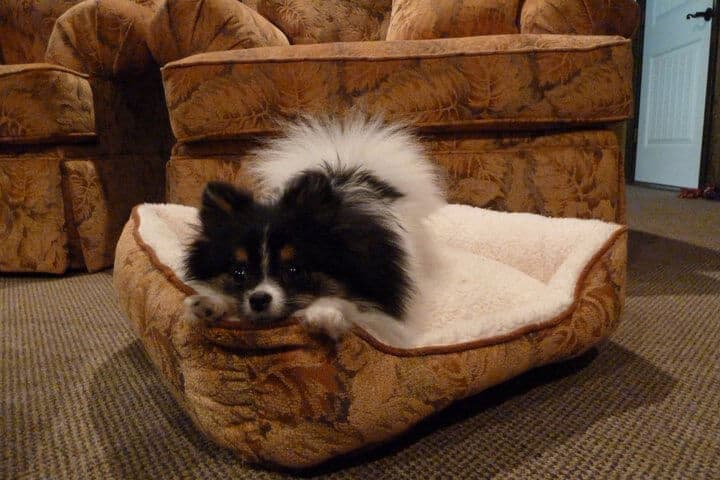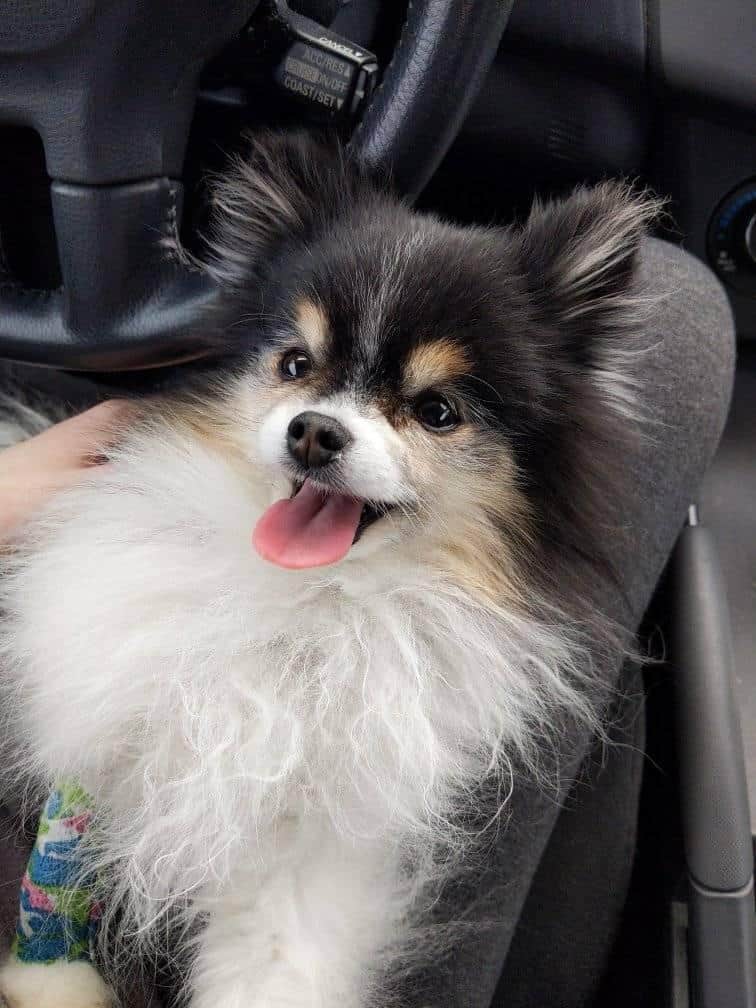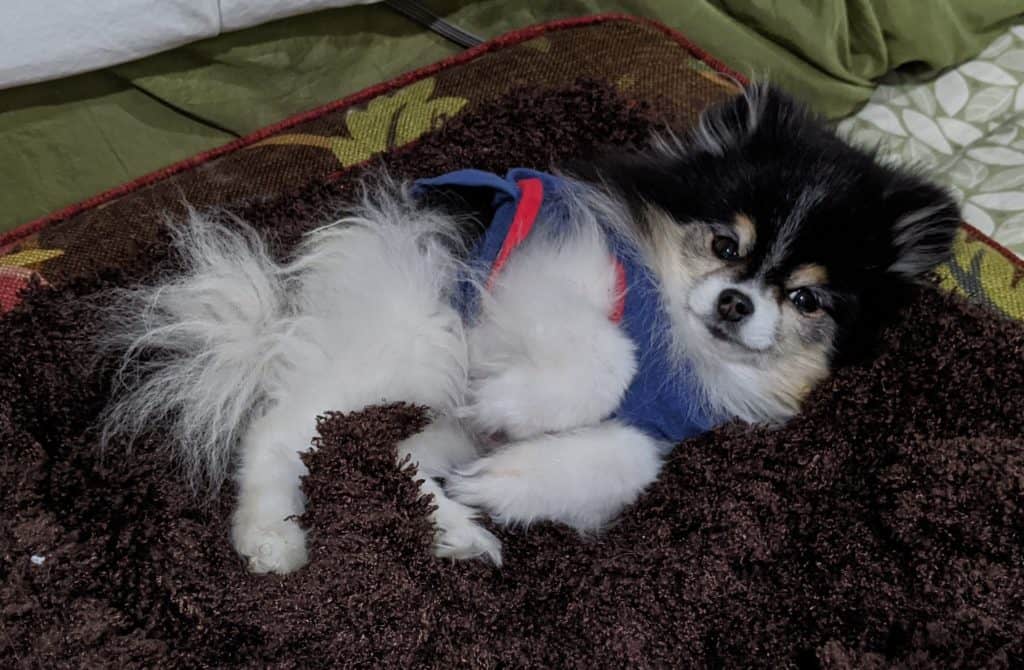
The bed that started it all.
The second week of February was a very traumatic week for us as we almost lost our baby Miya who is also the inspiration behind our custom dog beds. While many people have issues with Gallbladders it’s not as common in dogs, which in turn makes it not very well-known. It can be fatal and strike at any moment! We write this in an effort to get the word out about gallbladder issues in dogs, specifically mucocele’s in dogs as this struck too close to home and almost took our little baby from us!
About Gallbladder Mucocele:
Mucocele is caused when the gallbladder lining secretes abnormally thick mucus which then accumulates and becomes thicker and thicker to the point it obstructs the normal flow of bile from the gallbladder to the small intestines. When this happens, the gallbladder may rupture due to the over-distention of this sludge. (Source: AKC)
It’s most commonly seen in older small-to-medium size dogs that are around 10 years old. The breeds it most commonly affects are Shetland Sheepdogs, Miniature Schnauzers, Cocker Spaniels, Pomeranians (what Miya is), and Chihuahuas. (Source: MSPCA & AKC) If caught early, the survival rate is approximately 98% versus 80% who are clinically sick like Miya. (Source: NCBI) So, in other words, we wish this would have been discovered sooner so the surgery could have been performed before she got so sick which resulted in an even riskier surgery and longer recovery.
Symptoms include Vomiting, Lethargy, Appetite Loss, Jaundice, Abdominal Pain, Diarrhea, and Fever. (Source: VeterinaryPartner) Miya went from displaying no signs to all-of-a-sudden displaying all of these symptoms within a day, except for the tender abdomen and fever. Jaundice didn’t show up until the day after the vet admitted her.
Miya’s Story:
The day started out as any normal day would. Miya appeared to be her normal self and ate all of her food the night before. When we returned home from our errands she was all excited to see us jumping and barking. But when I went to feed her shortly after that she would not eat her favorite food. Once in a long while she would do that so it didn’t alarm me to much. The next day she still wouldn’t eat and now she wouldn’t even eat her favorite treats. She was still drinking water and I was able to get her to eat some lunch meat but she later threw up. I decided to take her to the vet first thing the next morning. When I woke up Monday morning I found bloody diarrhea on our sheets and immediately rushed her to the vet without an appointment before they were open. At this point, Miya didn’t want to move and was very lethargic.

Our vet got us in quickly and agreed she was very sick. They admitted her so they could run some blood tests and get her hooked up on IV’s. The blood test showed some things were out of range but nothing really stood out other than her being very hypoglycemic and dehydrated from not eating. By Wednesday (2 days later) she was starting to perk up under their supportive care but according to her blood work her liver enzymes, Bilirubin, and white blood cell count were now all way up and she was also now anemic. So while she felt and looked better, it would only be temporary as we still didn’t have a diagnosis. The vet mentioned Pancreatitis, Insolonoma, or liver damage (all very serious) but that she really needed to have an ultrasound done which they didn’t have. So we picked her up and took her to another vet who had the equipment. The new vet took some more blood work Wednesday afternoon and her numbers were continuing to climb more out of range. The new vet mentioned her liver was most likely being blocked and that it could be caused by her gallbladder being blocked (the other vet never even mentioned that as a possibility). So they took her back for an ultrasound and sure enough she said her gallbladder looked to be full of something called Mucocele. She said that because it wasn’t ruptured they’d have the surgeon verify in the morning and would proceed with removing her gallbladder if it was indeed the case.
Without her gallbladder removed Miya would have most certainly passed away but with it removed she could live a normal life. Statistics for surviving the postoperative period was approximately 80% (20% chance she could still pass away). That was terrifying but we knew we had no choice. The next morning they confirmed via ultrasound that it appeared to be Gallbladder Mucocele and that they would be proceeding with the gallbladder removal surgery (cholecystectomy).

Shortly after the surgery we got a call she made it through and did great! We were so relieved but knew she still had a long recovery as her gallbladder also caused liver inflammation/damage which the vet noted so she also took a biopsy of her liver when she was opened up as well. Two days after the surgery she was still anemic and her liver enzymes & bilirubin hadn’t dropped much if at all and her white blood cell had increased. So they said that she needed more time to heal and couldn’t be released yet. So Monday came and we were so anxious and hopeful to learn that her numbers were decreasing and were starting to go in the normal direction. We got the call we were hoping for that her anemia was greatly improving! Her liver enzymes and bilirubin were still a bit elevated but going down and that it may take time as she needed to be on liver medicine and would need to be for the rest of her life. But, finally, one week after we first took her to the vet, we were finally able to take our little baby home!
At the time of writing this blog post (one month later), she is doing great and appears to be back to her normal self. Her liver enzymes are still slightly out of normal range but they are getting closer to normal, so she is improving. The first two weeks after gallbladder surgery are the most critical and she made it through and is doing great. We are so happy to have a local experienced vet who identified the problem right away and could perform the surgery to save her life.
We hope this blog post can help spread the word to other dog owners in order to possibly save their pet’s life if they could experience a gallbladder mucocele at some point in their life. If you have one of the breeds listed above, please talk to your vet about the best time to get an ultrasound done of your pet’s gallbladder in hopes of catching it before it becomes life-threatening.
UPDATE: In Winter 2021 we found out that Miya had congestive heart failure and was started on medicine. She was doing great on the medicine, but on 5/17/2023 her heart couldn’t keep up anymore and we lost our baby girl. We are so grateful for the extra 3 years we were given with her! While she is gone, her legacy continues. Rest in Peace my baby girl (6/10/10 – 5/17/23) 💔
Below is a picture we had taken of her in January 2023. We are so blessed to have had her apart of our lives.
